

Timeline: 2000

Artifacts interview
On February 10 Cale speaks at length about the avant-garde in the Sixties, from his days at Tanglewood, working with La Monte Young, Andy Warhol and The Velvet Underground. The interview is preserved by the Artifacts website.
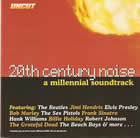
"Leaving It Up To You" on "20th Century Noise - A Millennial Soundtrack"
Leaving It Up To You is one of the tracks on the 20th Century Noise - A Millennial Soundtrack CD that was included with the January issue of the English music monthly Uncut.
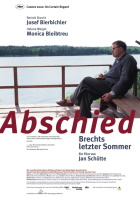
Scoring "Abschied"
Writes the score for Abschied by German director Jan Schütte. It is a fictionalized story about playwright Bertold Brecht, spending his last days in the DDR in 1956.

Producing Mediæval Baebes
Produces the album Undrentide of the English singing group Mediæval Baebes. He added non-medieval instruments, including saxophone and electric guitar to spice things up a little. Band member Katharine Blake:
"We weren't very happy with what Cale did because he was very much doing what the record company told him to do, which was to try and make it sound all modern."
The bossa nova version of the At a Springe-wel track is left off the UK-release of the album at the last minute. It was supposed to be included for the rest of the world, but that did not happen either.
Omnes Gentes Plaudite (The Drinking Song) is included on the Conflict & Catalysis: Productions & Arrangements 1966-2006 compilation album (2012).

Beautiful Mistake
Writes the score for the film Beautiful Mistake (Camgymeriad Gwych) which also features music by Welsh bands Catatonia, Derrero and Super Furry Animals. Directed by Marc Evans, who also directed House of America, a movie to which he contributed a piece for the soundtrack in 1997.
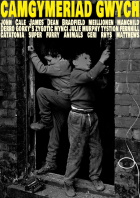
Cale plays piano and organ throughout the film. He performs Ready For Drowning and Some Friends with James Dean Bradfield from the Manic Street Preachers, Buffalo Ballet with Derrero, and I Keep A Close Watch with Cerys Matthews from Catatonia. Viola on Gwyddbwyll with Tystion.
The movie premiered at the Cardiff International Film Festival on November 29.
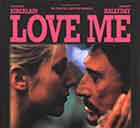
Scoring "Love me"
Soundtrack for Love Me, directed by Laetitia Masson. Cale contributes nine instrumentals. The Fragments Of A Rainy Season version of Heartbreak Hotel is also on the album. Limited edition of 10.000 numbered copies.
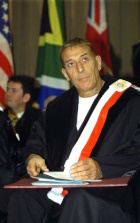
Doctor honoris causa John Cale
Receives an honorary degree from The Antwerp University in Antwerp, Belgium) on May 24th. Mathematics professor - and fan of his music - Robert Lowen acts as his promoter. After the ceremony, he signs autographs for students and professors. By way of thanks he plays an impromptu show on May 30 at arts center De Singel in Antwerp.
Sugar Ray cover "Spinning Away"
American rock band Sugar Ray do a cover on the soundtrack of The Beach movie: the Cale/Eno track Spinning Away from Wrong Way Up.
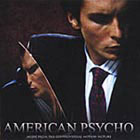
Scoring "American Psycho"
Writes the score for American Psycho, based on the novel by Bret Easton Ellis about a yuppie going berserk. After much hassle - the producers wanted the publishing rights and Cale was not having that - the final soundtrack includes two short pieces of the music, ruined by voice-overs from the actors in the film. A promo copy of the full score exists and it was included in the extras of the DVD.
Writer/Director Mary Harron on Cale's score:
"Cale was going for a soulful, even melancholy sound to compliment the soundtrack's poppy brightness (...) at times had to write the soundtrack playing in Bateman's head. John had to write in a more Hollywood style to match Bateman's surreal, overblown shootout scene. In a way, Bateman is living his own movie, especially towards the end. We needed a score to mirror Bateman living out his fantasy."
Spiritualized cover "Why Don't You Smile Now"
English rock band Spiritualized release a slow cover of Why Don't You Smile Now on a 3-track CD single. Contains the full version and an edited version. The full version is included on their Complete Works Vol 1 album released in 2003.
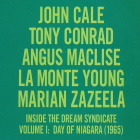
Inside The Dream Syndicate Vol. 1: Day Of Niagara 1965
Release of Inside The Dream Syndicate Vol. 1: Day Of Niagara 1965, a legendary piece by the avant-garde group The Dream Syndicate, led by La Monte Young.
Other players besides Cale and Young on this release are Marian Zazeela, Angus MacLise and Tony Conrad. It was recorded on New York on April 25, 1965.
"These recordings are (part of) a library of effort that represented, for Tony and I at last, a labour of love. The power and majesty that was in that music is still on these tapes."
John Cale
"What I had learned first about John Cale was that he had written a piece which pushed a piano down a mine shaft. We hungered for music almost seething beyond control - or even something just beyond music, a violent feeling of soaring unstoppably, powered by immense angular machine across abrupt and torrential seas of pounding blood."
Tony Conrad
The original tape of this recording was copied in 1976 by Arnold Dreyblatt, who was an assistant of La Monte Young, and that copy had been gathering dust for decades before it ended up with the record label, which might explain the below-par sound quality and other issues. Dreyblatt shed some light on it in a letter that was published in the September issue of English music monthly The Wire:
"Back in the mid 70's I had attempted to confront Tony with my estimation of that period, and found that he was steadfastly loyal to his former colleague, whatever feelings he might have held privately at the time. During the following decade, Tony's patience must have run out, and he joined with John Cale in requesting full cocomposer status, which has probably made any accommodations on La Monte's part that much more difficult. During our sporadic contact in the 80's and 90's Tony and I informally planned an extensive conversation on these and other subjects which unfortunately never took place. It was by chance that I recently learned about the impending release of Day of Niagara by thumbing through a copy of The Wire in a German train station, which I recognized as having been derived from a copy of "that tape", which I had unwittingly left in someone's hands. I have often sympathized with Tony's frustration at the difficulty in having access to the tapes on which he appears, yet what can sometimes be seen as a conspiracy, is partially due to La Monte's interest in later periods of what he understands as his own work, periods which La Monte considers to be more "mature"."
La Monte Young disowned the release and there was talk about legal action. On July 10, 2000 he posted a statement on to that effect his website:
"The Table of The Elements (ToE) CD 74, "day of Niagara" April 25, 1965, is an unauthorized release of my music from my ongoing composition, The Tortoise, His Dreams and Journeys (1964-present).
I have taken the position all along for many years that I am the sole composer of the underlying musical composition on this recording.
It is my understanding that the performers on the recording can no longer contest my position because the three-year statute of limitations on their claims of co-authorship expired many years ago.
Further, I believe that my position is correct as a matter of substantive law as well. As I previously stated in an interview published in The Wire magazine (Issue 178, December 1998): "To be co-authors you had to agree that there was co-authorship, which I of course never did; also, in order to be co-authors, your section, whatever your contribution is, has to be copyrightable by itself, which the contributions of Cale and Conrad may not be."
The sound quality of my Original Master tape is certainly measurably superior to the "now restored and digitally remastered" CD made from the allegedly unauthorized copy of my tape that has somehow surfaced at Table of The Elements. Many of the reasons for the poor sound quality of the CD are enumerated in Section II, "Sound Quality of the CD" below. The version ToE wants to release is flawed and contains several problems that were created in the process of the unauthorized copying, not the least of which is that approximately one and a half minutes of music are completely missing from their copy."
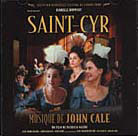
Scoring "Saint Cyr"
Release of the soundtrack for Saint Cyr, a movie by French film director and screenwriter by Patricia Mazuy set in the 17th Century at the court of Louis XIV. The score was nominated for a César (the French Academy Award) for Best Original Music.
He would connect again with Mazuy again, writing the score of Sport de Filles in 2012 (which also used Pile A L'Heure from the Extra Playful EP) and the score for her Paul Sanchez est revenu! movie in 2018.